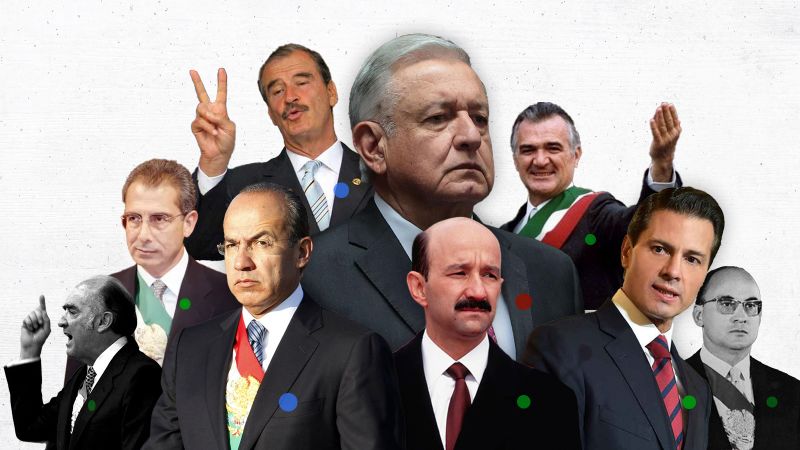Presidentes de México: Historia Completa – Un Viaje a Través del Poder
Mexico's history is rich and complex, profoundly shaped by its presidents. Understanding the Presidentes de México and their impact is crucial to grasping the nation's trajectory. This comprehensive guide explores the complete history of Mexican presidents, from the dawn of independence to the present day, offering insights into their presidencies, legacies, and the challenges they faced.
From Independence to Revolution: The Early Years (1821-1910)
Mexico's journey to independence was fraught with challenges, setting the stage for a turbulent early presidential history. The first president, Agustín de Iturbide, declared himself Emperor before his eventual overthrow. The subsequent decades saw a cycle of instability, with numerous presidents coming and going, often through coups and internal conflict. This period highlights the struggles of nation-building and the fight for political stability.
Key Figures of the Early Republic:
- Guadalupe Victoria: The first president of the First Mexican Republic, facing immense challenges in consolidating power.
- Antonio López de Santa Anna: A dominant figure, known for his multiple terms and involvement in significant historical events like the Texas Revolution. His legacy remains highly debated.
- Benito Juárez: A pivotal figure, championing liberal reforms and resisting French intervention during the Second Mexican Empire. His presidency marked a turning point towards a more modern and liberal Mexico. Learn more about his Leyes de Reforma.
- Porfirio Díaz: His long dictatorship, while bringing economic growth, also solidified social inequalities and ultimately led to the Mexican Revolution. Understanding Díaz's era is crucial to understanding the 20th century.
The Mexican Revolution and its Aftermath (1910-1940)
The Mexican Revolution (1910-1920) fundamentally reshaped Mexico's political landscape. This period saw a series of revolutionary leaders vying for power, each leaving their mark on the nation's development.
Key Players of the Revolution and its Consolidation:
- Francisco I. Madero: The initial leader of the revolution, his idealism and relatively short presidency laid the groundwork for the conflict that followed.
- Victoriano Huerta: His brief, brutal dictatorship further inflamed the revolutionary struggle.
- Venustiano Carranza: A key figure in the revolution, his presidency oversaw the drafting of the 1917 Constitution.
- Álvaro Obregón: A pivotal military leader, his presidency marked a period of reconstruction and stabilization.
- Plutarco Elías Calles: His presidency consolidated the revolutionary gains and established the Partido Revolucionario Institucional (PRI).
The PRI Era and the Transition to Democracy (1940-2000)
The PRI's dominance for over seven decades profoundly influenced Mexico's political and economic development. This period saw a complex interplay of economic growth, social reforms, and political control.
Key Presidents of the PRI Era:
- Lázaro Cárdenas: Known for his land reforms and nationalization of the oil industry.
- Miguel Alemán Valdés: His presidency marked a period of economic modernization.
- Luis Echeverría Álvarez: His administration saw significant social unrest.
- José López Portillo: His presidency coincided with the Mexican debt crisis.
- Carlos Salinas de Gortari: His administration initiated significant economic reforms, including NAFTA negotiations.
Mexico in the 21st Century: A New Era of Governance (2000-Present)
The 2000 election marked a watershed moment, ending the PRI's unbroken hold on power and ushering in a new era of multi-party politics.
Recent Presidents and their Impact:
- Vicente Fox: The first PAN president, representing a significant shift in Mexican politics.
- Felipe Calderón: His presidency focused on combating drug cartels.
- Enrique Peña Nieto: His administration oversaw significant economic and social reforms.
- Andrés Manuel López Obrador (AMLO): The current president, his administration is characterized by a focus on social programs and a rejection of neoliberal policies.
Conclusion: Understanding the Presidency in Mexico
This overview provides a glimpse into the complex history of Presidentes de México. Further research into individual presidencies and their contexts is essential for a deeper understanding. This rich historical narrative offers valuable insights into the challenges and triumphs of nation-building, the evolution of Mexican democracy, and the enduring impact of leadership on a nation's destiny. To delve deeper, explore the archives of the Mexican government and reputable historical sources.
Keywords: Presidentes de México, Historia de México, Presidentes Mexicanos, Historia Completa, Mexican Presidents, Mexican History, Política Mexicana, Revolución Mexicana, PRI, PAN, Agustín de Iturbide, Benito Juárez, Porfirio Díaz, Francisco I. Madero, Álvaro Obregón, Lázaro Cárdenas, Carlos Salinas de Gortari, Vicente Fox, Andrés Manuel López Obrador.
